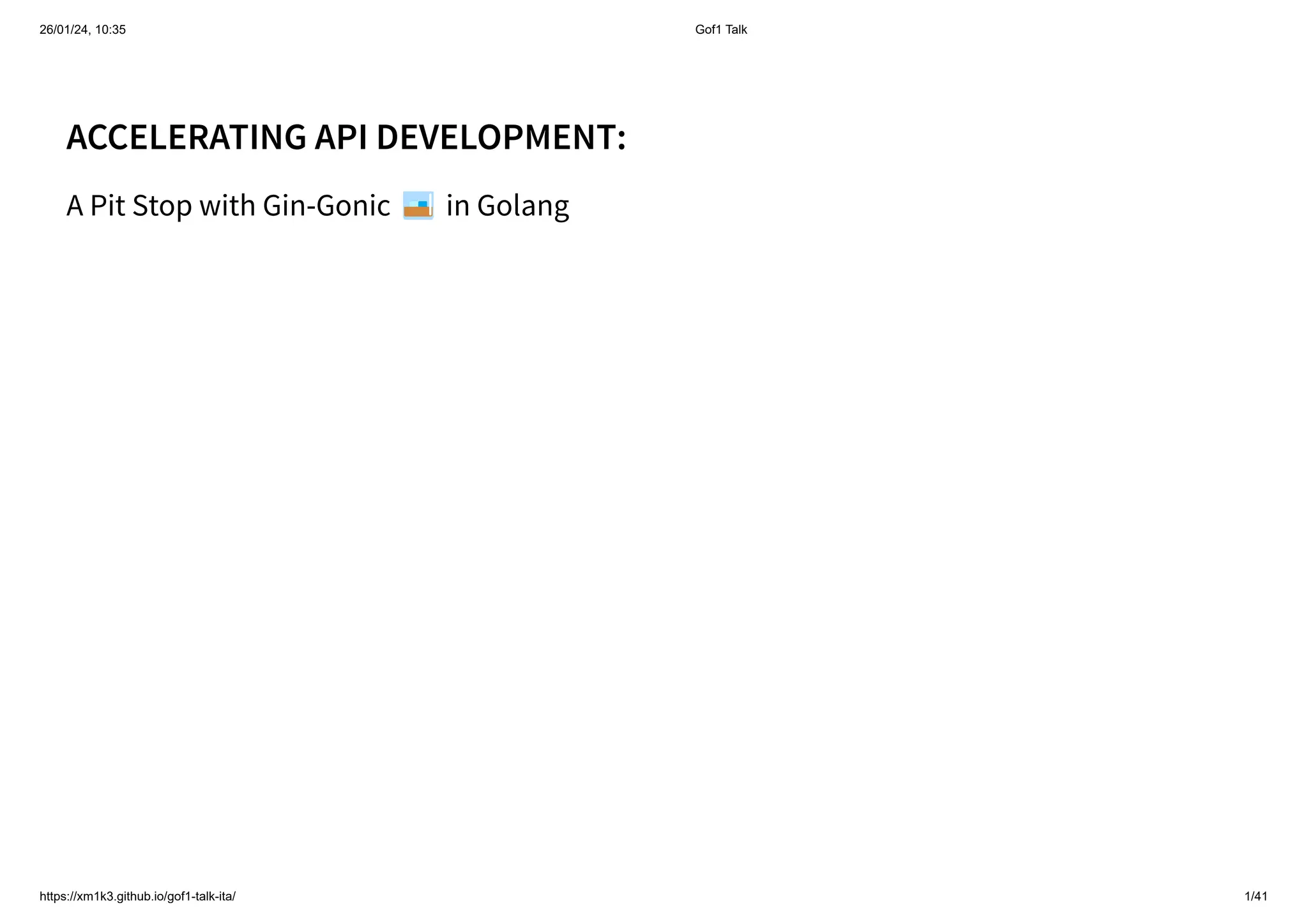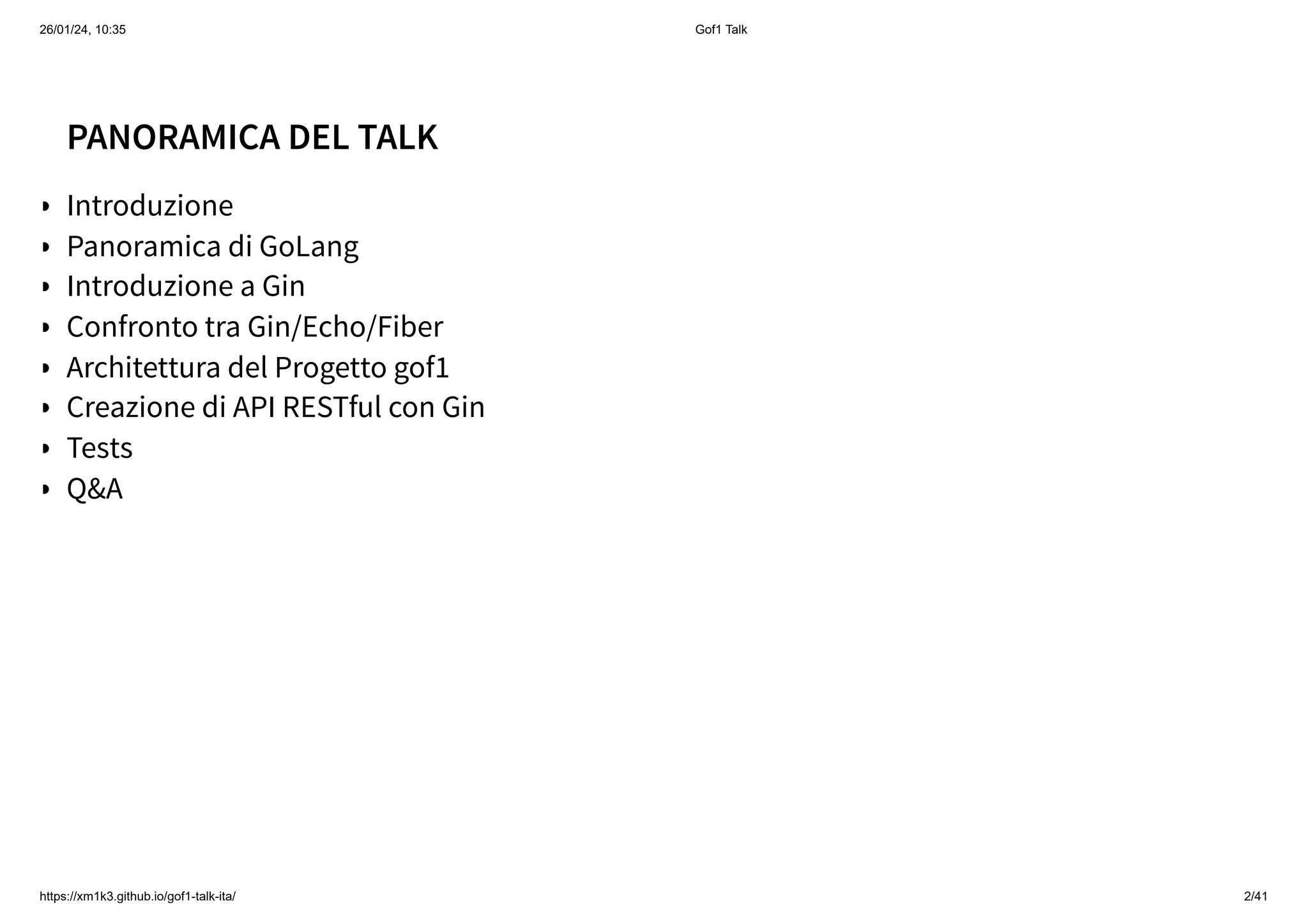Il documento offre una panoramica dettagliata su Go e il framework Gin Gonic, evidenziandone storia, vantaggi, caratteristiche e la creazione di API RESTful. Viene effettuato un confronto tra i framework Gin, Echo e Fiber, con focus sulle performance e l'usabilità. Inoltre, include un'illustrazione di architettura e configurazione per lo sviluppo di applicazioni web in Go.



















![26/01/24, 10:36 Gof1 Talk
https://xm1k3.github.io/gof1-talk-ita/ 20/41
INTERFACCE
Le interfacce in Go definiscono le firme per i nostri Service e Repository.
type F1Service interface {
AddDriver(driver models.Driver) error
GetDriver(id int) (models.Driver, error)
GetDrivers(page, limit int) ([]models.Driver, error)
GetDriversByYear(year int) ([]models.Driver, error)
GetDriverStandingsByYear(year int) ([]models.DriverStanding, error)
UpdateDriver(driver models.Driver) error
DeleteDriver(id int) error
ImportDriversFromCsv(record []string) error
...
}](https://image.slidesharecdn.com/gof1talk-slide-240126093859-5ae31894/75/Accelerating-API-Development-A-Pit-Stop-with-Gin-Gonic-in-Golang-Slide-pdf-20-2048.jpg)



![26/01/24, 10:36 Gof1 Talk
https://xm1k3.github.io/gof1-talk-ita/ 24/41
SERVICE
... ma aumentiamo di poco la complessità...
func (f F1Service) GetDriverStandingsByYear(year int)
([]models.DriverStanding, error) {
if year < 1950 || year > time.Now().Year() {
return nil, fmt.Errorf("year is out of valid range")
}
standings, err := f.Repository.GetDriverStandingsByYear(year)
if err != nil {
return nil, fmt.Errorf("error retrieving driver standings: %w", err)
}
if len(standings) == 0 {
return nil, fmt.Errorf("no driver standings found for year %d", year)
}
return standings, nil
}](https://image.slidesharecdn.com/gof1talk-slide-240126093859-5ae31894/75/Accelerating-API-Development-A-Pit-Stop-with-Gin-Gonic-in-Golang-Slide-pdf-24-2048.jpg)
![26/01/24, 10:36 Gof1 Talk
https://xm1k3.github.io/gof1-talk-ita/ 25/41
REPOSITORY
func (r F1Repository) GetDriverStandingsByYear(year int)
([]models.DriverStanding, error) {
var standings []models.DriverStanding
err := r.DB.
Table("results").
Select("drivers.id, drivers.forename, drivers.surname,
SUM(results.points) as points").
Joins("JOIN drivers on drivers.id = results.driverId").
Joins("JOIN races on races.id = results.raceId").
Where("races.year = ?", year).
Group("drivers.id, drivers.forename, drivers.surname").
Order("SUM(results.points) DESC").
Scan(&standings).Error
return standings, err
}](https://image.slidesharecdn.com/gof1talk-slide-240126093859-5ae31894/75/Accelerating-API-Development-A-Pit-Stop-with-Gin-Gonic-in-Golang-Slide-pdf-25-2048.jpg)








![26/01/24, 10:36 Gof1 Talk
https://xm1k3.github.io/gof1-talk-ita/ 34/41
]](https://image.slidesharecdn.com/gof1talk-slide-240126093859-5ae31894/75/Accelerating-API-Development-A-Pit-Stop-with-Gin-Gonic-in-Golang-Slide-pdf-34-2048.jpg)






